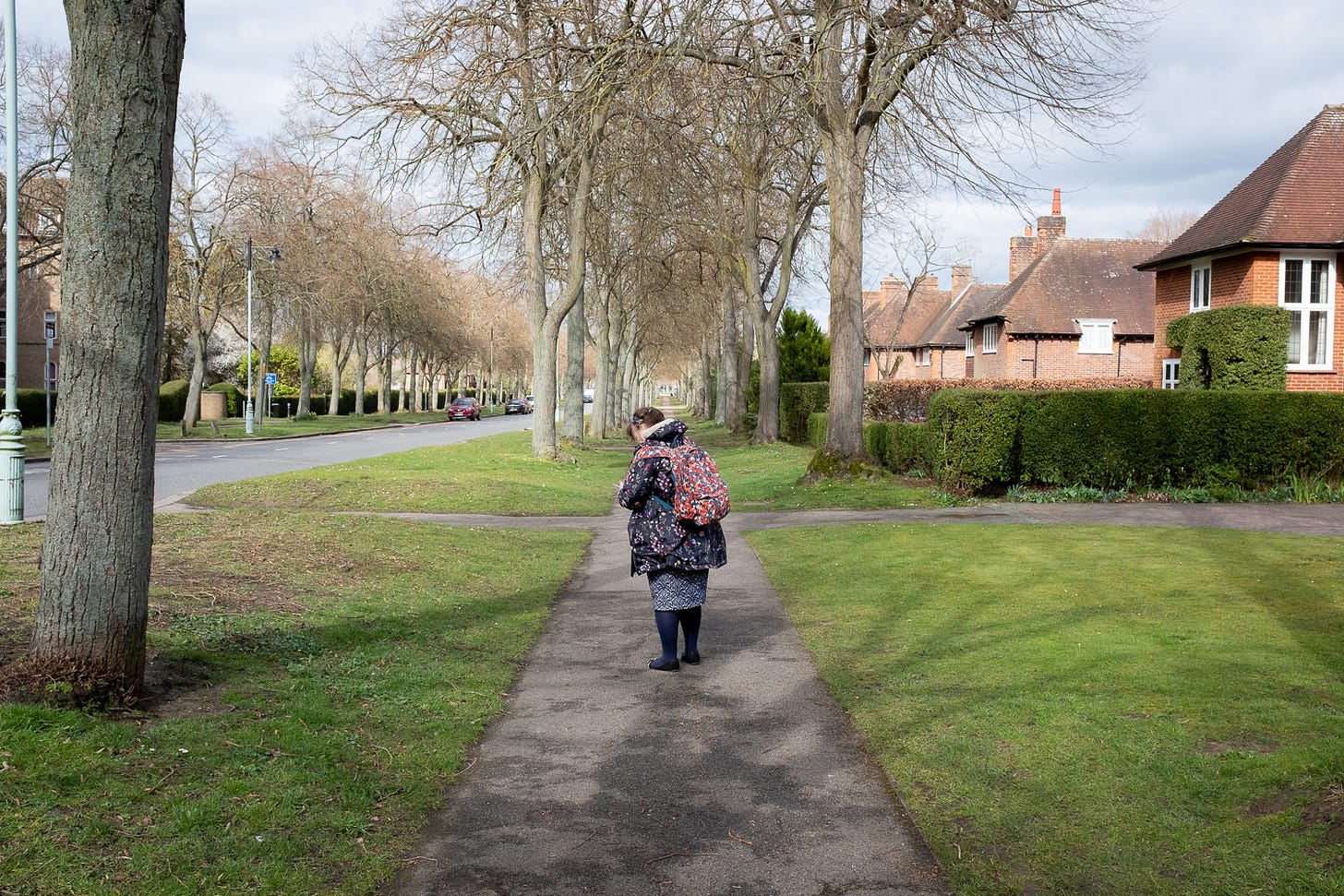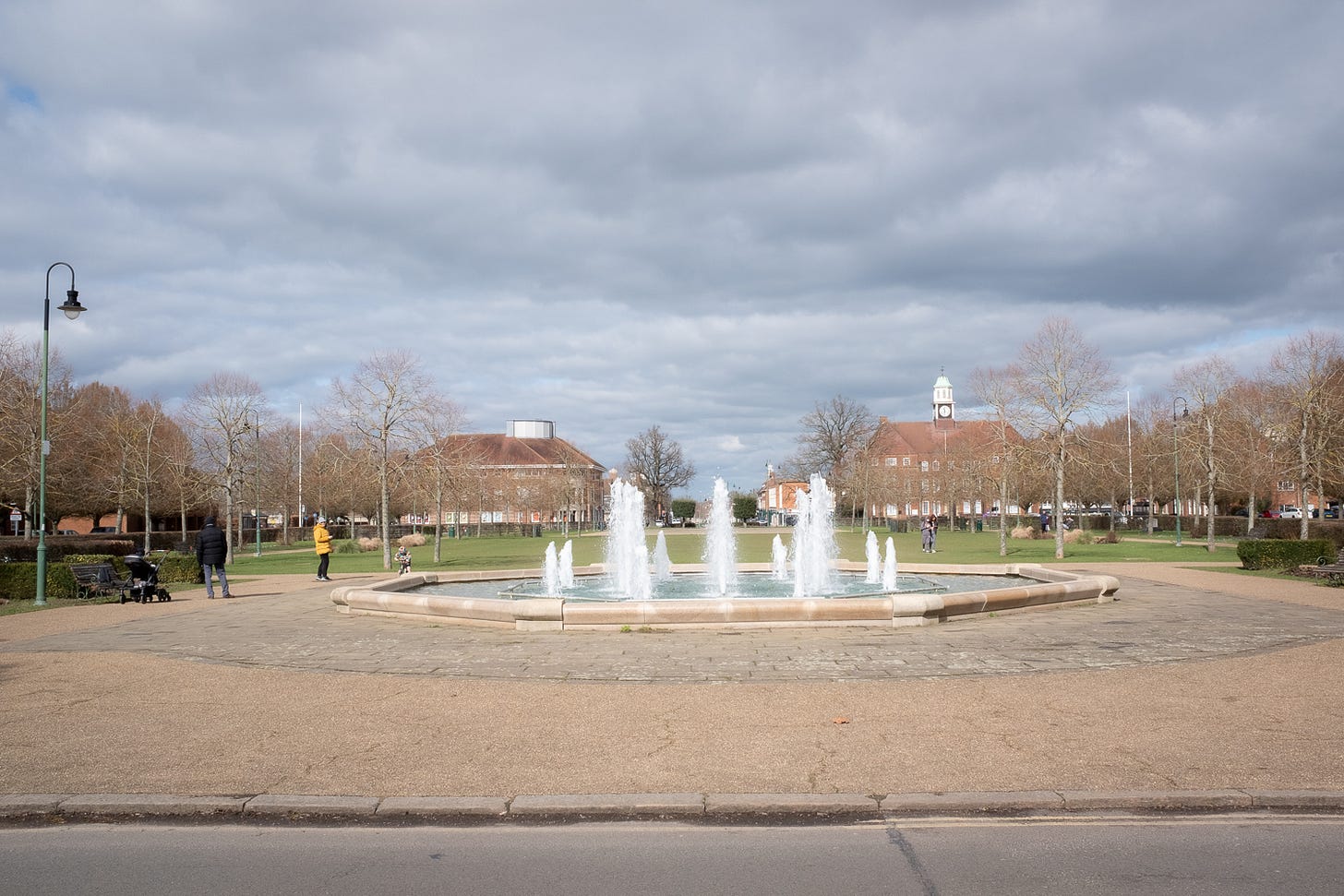There was a hiss and a splash and my shoes got wet. Standing by a puddle is never sensible. I swung my muddy shoes into the footwell of Adam’s car and we went to Letchworth. Adam’s girlfriend lived there; he lived in Newmarket.
“Do you go to the races much?”
“I’ve been about 20 times,” he nodded, “Never watched a race in my life though. You just get shit-faced don’t ya?” He wasn’t into gambling much either - not lucky enough, “Anyway, why are you going to Letchworth?”
Letchworth Garden City is one of those places that has a reputation. Most people have heard of it somehow. Maybe it’s because it’s got an unpleasant name. Letchworth. Or perhaps it’s because the idea of the Garden City is modestly interesting - a nice idea that most people accept didn’t quite work, or maybe it did. I don’t think anyone knows. My only memory of it was the monkey puzzle trees.
I explained all this to Adam without much coherence.
“Suppose it’s all right,” he shrugged, “Not much going on really.”
Adam’s indifference didn’t stop him trying to move there. Finding a two-bedroom house with a garden and a garage was practically impossible though. The town was full of four-bedroom houses and two-bedroom flats, nothing in between. “I don’t want four bedrooms,” he complained, “Too expensive, and too big anyway. And I don’t want a flat because they don’t have a garden. After all those lockdowns, I need a garden. I’m not getting shut up in a gardenless flat. I’d go mad!” Adam thought the second lockdown had been a mistake but reckoned there’d probably be more one day.
“The trouble with the housing is they’re only building flats. That’s what the builders make the most money off.”
Adam knew that because he was a builder. He was a project manager for a construction company and was currently building a suite of new labs for Hatfield University.
“Rent’s so expensive nowadays too,” he went on, “I don’t understand how most people get by. With inflation going mad, things are only going to get worse.” He shook his head - a big, balding thing. Nevertheless, he felt fortunate that he had a good job. He was insulated from the worst of it. The many that weren’t so lucky would be in real trouble. Politics didn’t seem to offer any solution either. Labour and Tory were basically saying the same thing now.
“I feel sorry for the young,” he continued, “How old are you?”
“25.”
“Your generation. I feel for you. When I was your age, I could get a 105% mortgage on a salary of £18,000. That got me on the ladder. No chance you’d get that now. Either you get help from your parents or you’re screwed.”
“I suppose reckless mortgages did cause the worst crash in a century,” I rebutted for the sake of balance.
“Only in America though,” he corrected me, “and they were being really reckless!” We chatted amiably about subprime mortgages, bankers’ avarice and inequality.
“You know, now you’ve got to get £40,000 for a deposit just to get a house that’s worth a couple hundred grand. I don’t know many people who can do that. If you haven’t got rich parents…” He shook his head again, despairingly this time.
Letchworth was a good place to be talking about housing. Its whole being was an attempt to solve the last housing crisis. It was meant to be a sort of utopia, an escape from the squalor of late Victorian industrial cities. But it was more than that too. At its heart was an idea of community and shared ownership.
The vision came from a slum survivor, a man called Ebenezer Howard. He saw that ownership of private property was the cause of poverty. He imagined a city where land was owned by the community and where industry and housing were separate. Profits from rent were pooled for the people not siphoned for the few. George Bernard Shaw got on board early. “There should be a levy on landowners who make these huge windfall profits,” he suggested, “and the money should be used to benefit the local community as a whole.”
Today, the town still has its own foundation that reinvests every pound of rent it receives. It’s the only place that has that. There’s a free day hospital that’s never had a penny from the NHS, entirely funded by Howard’s vision.
Nevertheless, Letchworth never quite found the success it hoped for. The sheen wore off and it steadily slid into obscurity. Maybe the issue was one of marketing. By Orwell’s day, it was, in his opinion at least, full of “every fruit juice drinker, nudist, sandal wearer, sex-maniac, Quaker, nature cure quack, pacifist and feminist in England.”
Letchworth was built on socialist principles but in Orwell’s mind, there were two types of socialists. There was the typical working-class type, “the warm-hearted un-thinking socialist, who only wants to abolish poverty and does not always grasp what this implies,” and it was for them the city and its factory were built. In reality, though, it was too expensive and Letchworth got the middle-class socialists instead, “The intellectual, book-trained Socialist, who understands that it is necessary to throw our present civilization down the sink and is quite willing to do so.” The poet John Betjamin agreed, capturing the essence in his poem ‘Group Life’ which was all about Letchworth. “Wittle-tittle, wittle-tittle, toodle-oddle ducky birds,” he mocked, “What a lot my dicky chicky tiny tots have done.”
Brian and I approached the town from the north, passing through Baldock’s handsome centre on our way in. I pointed out the caff that does the best fry-up I’ve ever had. “Oooaar,” Brian growled, “I love a fry-up!” He patted his paunch lovingly, “As you can tell.” The thought of a fry-up got him going, especially since he’d been put on a diet by his girlfriend.
“Avocados on toast for you then?”
“Nahh not quite that bad….”
Obviously, Letchworth was no longer entirely full of vegetarians.
Nowadays, Letchworth’s reputation seems to have mellowed. Maybe it’s because fruit juice drinking, promiscuity, pacifism, feminism and sandals are pretty run-of-the-mill these days - that is if Crocs count as sandals. Or perhaps it’s because the types Orwell so despised have moved back into London, probably to Islington.
Brian drove me through Letchworth’s town centre, pointing out the water fountain and the cinema. The big open square, Broadway Gardens, was all neatly laid out, making it feel like a rural version of Tashkent or any one of those provincial Soviet cities.
I asked Brian for any recommendations in town for lunch. He thought for a moment before suggesting a cafe. “The biggest trouble with Letchworth,” he huffed, “is there are no good pubs.”
That made sense, I replied, given that Ebenezer Howard was a teetotaller. The town didn’t have a single alcohol-serving pub until the 50s. Up til then it was proud to have probably the only pub in the country which didn’t serve beer.
“Ahhh! That does make a lot of sense,” Brian hadn’t heard that before, “I thought it was a bit odd!”
I said goodbye and walked about. The town centre had a tranquil feel. People pottered about doing nothing in particular. There were the usual collection of charity shops and cheap cafes, though some of the shops seemed a little more crafty than most towns. The highlight was a huge bookshop that sprawled out onto the street. Passers-by leafed through the stalls, piled high with old copies. Inside a couple of punks in leather and matching twinkling nose rings flicked through records and mystery novels.
There was something pleasant about the town. It was boring, admittedly, sterile perhaps even, but it was pleasant all the same. The spacious houses, avenues of lime trees and the boulevard streets. It all looked comfortable and nice. It was suburbia. Even the town centre, paradoxically, looked like suburbia. After all, Letchworth was the blueprint for suburbs all around the world. Howard’s quietly revolutionary vision was copied far and wide, from Australia to China. Most suburbs with their leafy cul-de-sacs and neat front gardens owe something to Letchworth.
On my way out of town, I passed the country’s first roundabout. Several radial roads stretched away from it like a very bland version of the Arc de Triomphe roundabout that it was based on. Its simple sensibleness seemed to epitomise the town.
I realised as I went on that perhaps the town could be a model for just the sort of thing we need. The housing crisis we face is very different to the one Howard was dealing with. Scale and numbers are the issue today. A government report said we need to build 300,000 homes a year for over 20 years to get anywhere near solving the problem. With a population of just 34,000, Letchworth hardly holds all the answers, but there’s plenty to learn from its values of community, shared ownership and appreciation of nature.
I stood on a road somewhere near the edge of town. The first car to pass stopped to give me a ride. Somehow I wasn’t surprised.
Beth had a funny way with words and spoke as if she was eating them. I was only going a couple of miles up the road to Hitchin. Hitching to Hitchin she pointed out. She had been at her daughter’s all morning, digging up the garden and was on her way to a garden centre now to buy some seeds to plant it.
I asked why.
“Well,” she replied, “I happen to think gardening is the way to go these days.”
Maybe she’s right, and maybe garden cities are the way to go too.






